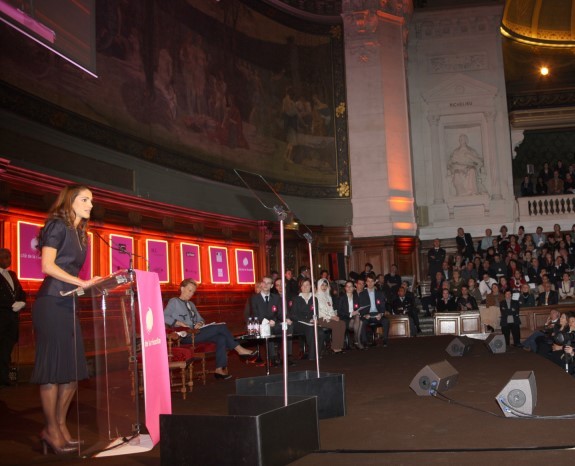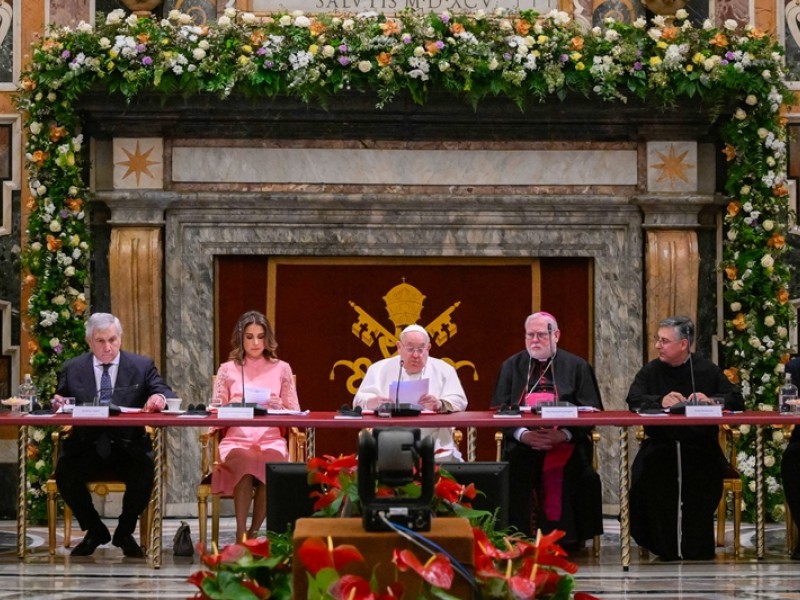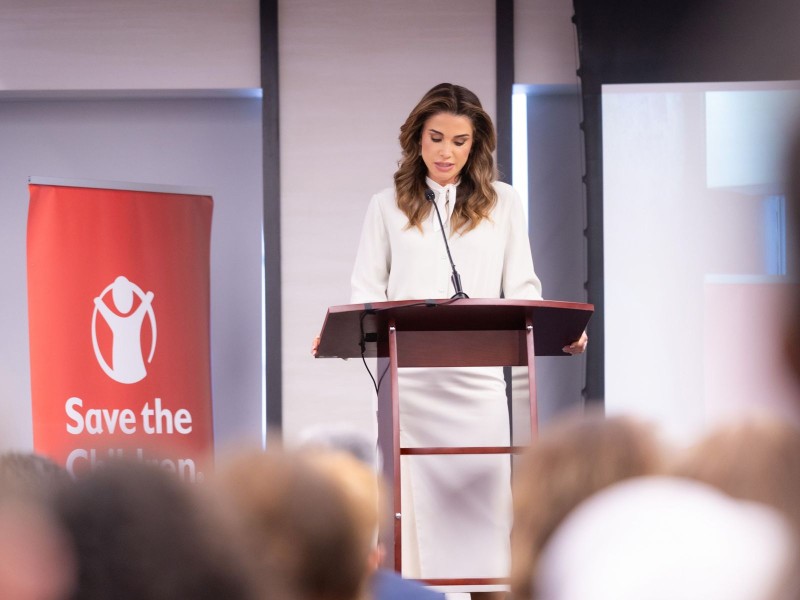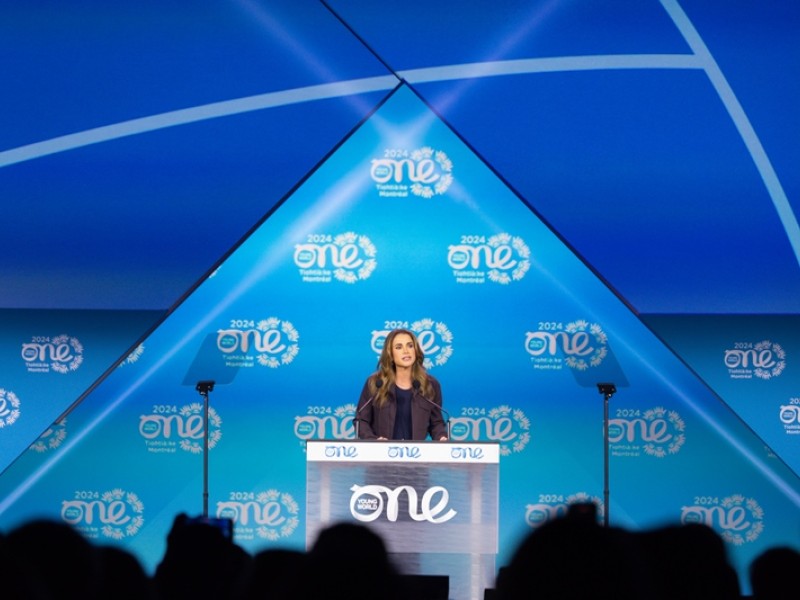Queen Rania's Speech at Paris-Sorbonne University - Paris, France

Victor Hugo once called Paris “an immense hospitality.” Cole Porter sang that Paris is a “timeless town” from the “winter when it drizzles” to the “summer when it sizzles.” And Frank Sinatra described April in Paris as a feeling no one can ever reprise.
I promise, I will spare you the pleasure of my bursting into song here today.
But I’m delighted to be here.
Or, more accurately, I should say I’m delighted to be back … because my family and I are frequent visitors to your beautiful country.
I’ll always remember joining my husband, His Majesty King Abdullah, here nine years ago, shortly after the death of his father, His Majesty King Hussein.
We were both deeply moved when, to mark the visit, the city of Paris named a street in honor of his late Majesty. King Hussein loved France, from his first meeting with General de Gaulle… to the many trips he made to this country over the course of his life.
And this country holds a very special place in my heart too. France was one of the first countries I visited after I came into this position. Back then, I was very young, daunted by the enormity of the responsibility, and not used to being in the public eye. And yet, the warm embrace I received from the French people steadied me, gave me courage, and bolstered my conviction…and that has remained with me to this day.
Yes, I could talk for hours about your wonderful country, but that’s not why I’ve been invited here today.
I’m here to talk about engagement, which is, of course, the theme of this year’s Cité de la Réussite… engagement in the sense of dedicating ourselves to the betterment of humanity…and working -- as individuals and together -- for understanding, global harmony, and peace.
And I think it’s especially appropriate that we are meeting at the Sorbonne – not only because this has long been a center of international enlightenment, but also because the Sorbonne was the birthplace of one of the greatest symbols of global harmony – the modern Olympic Games, which began on this day, 112 years ago.
When Pierre de Coubertin first founded the International Olympic Committee here at the Sorbonne, he understood the Games could be more than just a simple competition. He saw the Games as a time for humankind to join in shared celebration … where all would have the chance to do their best and to bring out the best in one another… where people could be judged by their ability and achievement, not by color, background, or creed.
The Olympic spirit of friendship… solidarity… and fair play… taps into universal values people everywhere understand.
And yet, too often, in our day to day lives, we fall short of these noble ideals.
And this is tragic, because more than ever, we are all on the same team – facing problems like poverty, climate change, and disease, that humankind can only solve by joining together.
In part, our lack of true global community is a backlash to globalization. As borders blur and new cultures make their mark on old societies, many people are finding the shifting social landscape profoundly unsettling. Suddenly, we seem to be living side by side – yet we’re not sure we’re prepared to be neighbors. And for many people, the instinctive response is to pull back instead of reaching out… fearing that the few things that make us different are more important than the many things that make us the same.
But over time, failing to get to know one another makes the tensions grow worse, not better. It allows preconceptions and biases to stand in for personal experience.
And we see the results in the mutual misunderstanding afflicting the world’s diverse cultures, not only among different countries but increasingly within them as well.
For me, as an Arab, a Muslim and a mother of four, the schism that worries me most is the growing gulf of perception and trust between the Muslim world and the West. The only people who benefit from our disunity are the extremists – the very forces who threaten the hopes we share for a brighter tomorrow.
Too often, this rift is reflected and reinforced by the tone of our interactions – whether the issue is how to balance the right to free speech with the need for respect among faiths… or the wearing of religious symbols… or the root causes of conflict… or immigration… or Islam itself. Instead of joining in conversation, each side feels that the other is shouting. Both sides feel increasingly aggrieved. Emotions overtake fact.
And just as troubling, the lack of empathy for each other can limit our own potential for progress. Because when we are blind to one other’s point of view, we often cease to look inward as well.
Perhaps as children, some of you read “La Besace” by La Fontaine. In that fable, Jupiter, the mythological God, summons all living things to gather at his throne. He tells the animals he is happy to fix any problems they might have with themselves, and asks them all, “Are you satisfied with yourself the way you are?”
The Monkey begins. He says he thinks he’s just fine, but that the Bear’s features are too coarse.
Then the Bear loudly praises his own physique, but says the Elephant is misshapen and ugly.
The Elephant says Madam Whale is too fat.
Madam Ant says the Mite is too small.
And so it goes, until Jupiter, angry, sends them all away – but La Fontaine writes that among all the creatures, humankind was the craziest of all… for in his words, “we forgive ourselves everything and forgive other men nothing.”
The lesson here is that without self-awareness, there can be no self-improvement.
And clearly, repairing the rift between East and West must begin with self-assessment on both sides. In the Arab region, if we truly wish to see global peace and progress, we know we must start by ending the conflicts within our own societies.
We know that as Muslims, we cannot complain that we are negatively stereotyped by the West, unless we ourselves address some of the factors behind those perceptions.
And while we are right to deplore Islamophobia, and the branding of Muslims as terrorists… we must face up to the fact that many terrorist attacks in recent years have been committed by people who wrongly claim to be acting in the name of Islam.
And I cannot speak for the West…I cannot suggest the issues for introspection or the areas for self-assessment, but I hope that you will think about what they might be… because building cross-cultural acceptance has to be a two-way street.
Dialogue requires us all to take part… to speak… to share… and to listen.
Because in La Fontaine’s story, the lash of insult and injury is handed from one creature to the next… but in real life, what we often see is mutual recrimination – the downward spiral of reproach and retaliation that becomes ever harder to stop.
We must break that cycle. We have to restore a sense of shared humanity… of connection… compassion… and willingness to stand in one another’s shoes.
And it may sound daunting. But I believe there is real cause for optimism too – starting with the findings of a fascinating poll that Gallup released earlier this year.
On the one hand, the poll shows that many in Europe and the United States are convinced the Muslim world isn’t committed to improving relations with the West.
Likewise, large majorities in every Middle Eastern country surveyed said they don’t think the West is committed to better relations with the Muslim world.
At the same time, people on both sides say, in overwhelming numbers, that the quality of the relationship between the Muslim and Western worlds is something important to them.
In other words: East and West both honestly believe it is important to fix the relationship. But both sides genuinely think that the other side doesn’t feel the same way.
So the problem isn’t that people don’t care. It is that they don’t see their caring reflected. They don’t perceive an equal sense of commitment from the other side.
We can change this. But we have to start by dismantling mutual stereotypes. We have to reject easy caricatures in favor of close inspection – whether we’re dealing with matters of integration and assimilation… or international relations more broadly… or the simple act of getting to know others different from ourselves.
That’s why I recently set up a YouTube account, so that YouTubers everywhere can join me in a cyber-conversation, and break down the damaging stereotypes of the Arab world which malign my region and its people. I hope to show viewers everywhere the truth about the part of the world I cherish and call home.
And the interesting thing is that as we exchange knowledge, we forge friendships in the process…virtual handshakes are extended, and new paths of understanding and acceptance are formed.
It’s that kind of caring that matters; and it can’t be decreed or imposed from above. It has to emerge from the bottom up… one open mind and open heart at a time.
And here, in this great institution of learning, I want to challenge each of you to do your part. For those of you who are students know it is your future that is at stake. You are the ones who will inherit the world that is taking shape today. You must decide if you want it to be a world of greater division… or greater unity.
I’m told that in May 1968, one of the student slogans was “those who lack imagination cannot imagine what is lacking.”
Well, I believe your generation has all the imagination you need to see where gaps need mending… and how progress can be made.
You were born at a time of increasing multicultural awareness. You have already been exposed to many more and different cultures than your grandparents could have imagined. You live in the country with the largest Muslim population in Europe. And you know that Islam is not monolithic, but a vibrant mosaic of cultures. You know it because you have seen Islam’s diversity for yourselves – in the North Africans… South Asians… Middle Easterners… Turks… and many others… who are proud to call France their home.
In addition, you know better than anyone the power of interconnectedness. Your generation has been enormously creative in building virtual networks that span the globe. From SkyRock and YouTube… from wikis to blogs… you’re transmitting ideas in new ways… exploring new outlets to express your views… and creating global communities online.
Your openness, and your willingness to connect, will both be powerful assets in replacing barriers of fear and mistrust with bridges of friendship and peace.
And just as the Olympic Torch is passed from hand to hand, together, you can create a fellowship of understanding that lights the way ahead.
You can be champions of peace and hope. And when you triumph, so will we all.
Thank you very much.
مواضيع مختارة
موقع جلالة الملكة رانيا العبدالله الرسمي
هذا الموقع الإلكتروني لا يدعم متصفحات الإنترنت القديمة. الرجاء تحديث متصفح الإنترنت إلى نسخة أحدث من إنترنت إكسبلورر 9
متصفح الإنترنت الذي تستخدمه قديم. لتحسين مستوى الأمان عند تصفح مواقع الإنترنت و مشاهدتها بالشكل الصحيح و بفعالية افضل قم بتحديث متصفح الإنترنت الخاص بك



